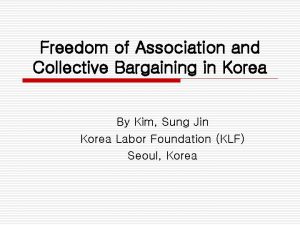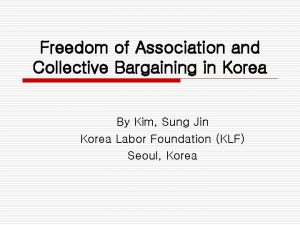The State of Freedom of Association and Collective












































- Slides: 44

The State of Freedom of Association and Collective Bargaining in SADC Countries ILO Centenary Celebration 4 - 5 October 2019 Mpfari Budeli. Nemakonde

OVERVIEW OF THE PRESENTATION 1. 2. 3. 4. 5. What is the state of workers right to FA and CB in SADC countries? To what extent do SADC countries comply with their obligations under Conventions 87 and 98? 100 years on, how has the ILO engaged with SADC countries in promoting the right to FA and CB and how have they responded? What have been the common challenges regarding FA and CB in SADC countries? Recommendations.

ILO CONVENTIONS OF FA & CB • The ILO adopted the two Conventions on FA & CB in 1948 and 1949 respectively. • All 16 SADC countries have ratified the two ILO conventions. • The ILO Conventions 87 and 98 are part of the eight ILO fundamental Conventions.

ILO CONVENTION 87 • • establishes general standards for freedom of association and the right to organize. the first major ILO instrument to protect FA and CB for workers, TUs and EOs. Article 2 • protects workers and employers right to form and join association of their choice.

ILO CONVENTION 87 Article 3 • protects collective rights of workers and employer’s organisations for example the right to draw up their constitutions and rules, to elect their representatives and to organise their activities without any interference from public authorities.

ILO Convention 87 Article 5 • Guarantees workers’ and employers’ organisations right to establish and join federations and confederations. Article 8 Requires workers and employers and their associations to respect the law of the land when exercising the right to FA. •

ILO Convention (98) • • It complements the ILO Convention No. 87. It protects the right to organize and makes provision for the development of machinery for collective bargaining. Article 1 • protects workers against any acts of antiunion discrimination in respect of their employment.

ILO Convention (98) Article 2 • protects workers and employers’organisations against any acts of interference by each other or each other’s agent. • Any act of anti-union discrimination during employment is prohibited. • protects workers, workers organizations as well as employers and their organizations.

States Parties’ Obligations under Conventions 87 and 98 State Parties obligation arises by Virtue of : q Ratification of ILO Conventions. (States are bound by all conventions that they ratified). ILO membership (ILO Declaration of 1998) (ILO Member States are required to respect all the eight Fundamental Labour Conventions). q

STATES PARTIES’ OBLIGATIONS UNDER CONVENTIONS 87 AND 98 • All SADC Members States – q q • are members of the ILO, and have ratified Conventions 87 and 98. In terms of Article 22 of the ILO Constitution, States have a duty to report on any progress made regarding any convention ratified.

RELAVENCY OF INTERNATIONAL LAW IN DOMESTIC LAW • There are two approaches: Monism and Dualism. Monism - International law is automatically incorporated into domestic law. - Once ratified, international treaties become part of domestic law and should be applied as such. q (Angola, Madagascar, Mozambique and the Democratic Republic of Congo)

RELATIONSHIP BETWEEN INTERNATIONAL LAW AND DOMESTIC LAW Dualism Approach • • • It is the opposite of monism. It contends that international law is different from domestic law. international law should be transformed into municipal law by legislation for it to be enforced at a domestic level. Ratification is not enough - legislation should be adopted to give effect to conventions. Remaining 12 SADC countries are Dualists.

SADC: A BRIEF OVERVIEW • • SADC was established in 1992 as a Regional Economic Community committed to regional integration and poverty eradication within Southern Africa through economic development and ensuring peace and security in the region. It is composed of 16 Members States (Angola, Botswana, Comoros, Democratic Republic of Congo, Eswatini, Lesotho, Madagascar, Malawi, Mauritius, Mozambique, Namibia, Seychelles, South Africa, Tanzania, Zambia and Zimbabwe).

SADC: A BRIEF OVERVIEW • • • Its headquarters are in Gaborone, Botswana. Since its establishment, SADC has adopted 27 Protocols and three Charters. important for this discussion are the – q q Charter of Fundamental Social Rights in SADC(2003). SADC Protocol on Employment and Labour (2014).

CHARTER OF FUNDAMENTAL SOCIAL RIGHTS IN SADC) • • The main objective of this Charter is to facilitate, harmonious labour relations through close and active consultations among social partners. The Charter expressly recognises basic human rights asserted in all international human rights instruments including ILO Conventions.

CHARTER OF FUNDAMENTAL SOCIAL RIGHTS IN SADC Article 4 • Protects workers and employers right to form and join TUs or EAs. • recognises TUs and EAs rights to negotiate and conclude collective agreements. • further recognises workers’ right to strike and employer’s right to invoke any remedy consistent with ILO instruments. • Charter binds SADC members states upon signature. • 12 SADC countries have signed (Angola, Botswana, Comoros and Seychelles have not signed.

SADC PROTOCOL ON EMPLOYMENT AND LABOUR The objectives of this Protocol are amongst other things to: q q q Promote social protection; social security; safe working conditions; facilitate labour migration for development; promote labour productivity; promote gender equality; and development of institutional capacities in the Region. the Protocol recognises the universality and indivisibility of basic human rights proclaimed in international human rights instruments. workers and employers right to form and join TUs and EAs is protected in Article 6. The right to strike is also protected. No SADC country has ratified this Protocol.

SADC MEMBER STATES’ COMPLIANCE WITH ILO CONVENTIONS (87 AND 98 • By virtue of being parties to the two ILO Conventions 87 and 98, SADC Member States have obligations to protect and promote workers right to FA and CB. • They should also report to the ILO supervisory bodies on their compliance with these Conventions.

OBLIGATION TO PROTECT AND PROMOTE WORKERS RIGHT TO FA AND CB. • • To comply with the obligation to protect and promote Workers right to FA and CB, all SADC Member States have included in their constitutions and labour legislation, provisions protecting the right to freedom of association for trade union purposes. Some States also included the rights to strike and to engage in collective bargaining.

THE OBLIGATION TO REPORT TO THE ILO SUPERVISORY BODIES ON COMPLIANCE WITH THE FA AND CB STANDARDS • • However, there are still some challenges with regard to FA and CB in SADC Region First: States failure to report regularly as required Second: States failure to effectively attend to the recommendations made by the ILO supervisor bodies. there is a disjuncture between domestic laws and practice in several SADC Member States.

COMMON VIOLATION OF FA & CB IN SADC MEMBER STATES • Identified Eight common acts of interference with the right to FA and CB by employers and governments in the region.

COMMON CASES OF VIOLATION IN SADC 1. 2. 3. 4. Serious acts of violence against striking employees by police or armed forces. Acts of violence and arrest of workers and TU leaders during strikes in various sectors. Attacks and intimidation TU leaders by police officials and dismissal for participating in strike actions. General prohibition of public service employees’ rights to associate and strike by governments.

COMMON CASES OF VIOLATION IN SADC Refusal by employers to allow striking workers to return to their work at the end of the dispute. 6. Allegations of serious anti-union discrimination in sectors such as mining, maritime and agricultural sectors 7. Expansion of the definition of “essential services” with the view of excluding some workers from participating in TU activities. 8. Countries setting excessive requirements for registering TUs. 5.

RECOMMENDATIONS • As we celebrate the centenary of the ILO, all SADC countries should be commended • • • for ratifying the two Conventions on FA&CB For entrenching these rights in their constitutions and labour legislation. However, a lot is still desired at domestic level as there is still a disjuncture between the law and the practice in several SADC countries.

RECOMMENDATIONS 1. 2. 3. 4. Recommendations for SADC Member States Recommendations for SADC Recommendations for the ILO Recommendations for Employers and Employers’ Organisations 5. Recommendations for Workers and TUs

RECOMMENDATIONS FOR SADC MEMBER STATES • • By ratifying international labour standards, States undertook to protect and promote the rights in those instruments both in terms of the law and practice. SADC Member States have to ensure that workers are able to enjoy their rights without any interference by the State, employers or employers’ organisations.

RECOMMENDATIONS FOR SADC MEMBER STATES First: international standards often provide minimum protection, States should provide higher level of protection. q For instance, States should ensure that legislative limitations on workers’ rights are not unreasonable so as to discourage workers from exercising those rights.

RECOMMENDATIONS FOR SADC MEMBER STATES • SECOND: tripartite dialogues should be encouraged between government, TUs and employers or EAs. q This requires States to be proactive and take steps to educate both workers and employers about their rights and duties. q This should include State facilitated workshops and roadshows especially in rural areas and informal sector, were workers are not familiar with their rights and how to enforce them.

RECOMMENDATIONS FOR SADC MEMBER STATES THIRD: SADC Members States should make available a register of both private and public companies or employers reported for violating the right to FA and CB. q employers should be penalised for violating workers’ rights.

RECOMMENDATIONS FOR SADC MEMBER STATES FOUR : States should refrain from using military and police forces to disrupt peaceful strikes. q In most SADC countries States use police and military officials to disrupt strikes even when they comply with national laws.

RECOMMENDATIONS FOR SADC MEMBER STATES Five: training should be provided for Judges to for understand the relevancy and importance of international standards and to apply them. q currently few Judges refer to applicable ILO standards when dealing with domestic issues. Lastly : Members States should provide training for Police and armed force

RECOMMENDATIONS FOR SADC • Workers’ rights are fundamental rights. • Given the role of workers in regional integration, SADC should take the protection and promotion of workers’ rights seriously. • Regional integration and prosperity in the region depend on workers and the conditions under which they work. • The protection of workers’ rights in the region should be the first step to regional integration as regional integration may not be possible without the integration of labour standards in the Region.

RECOMMENDATIONS FOR SADC • FIRST: SADC should establish a bureau to monitor States’ compliance with ratified ILO conventions. • SECOND: encourage tripartite dialogue between State, employers, EOs and TUs regarding progress made on fundamental labour standards which includes the two conventions on FA & CB. • THIRD: SADC should encourage employers’ organisations and TUs to form and join regional federations to deal with labour issues at the regional level.

RECOMMENDATIONS FOR SADC • FOURTH: SADC should encourage its Member States to ratify the ILO Convention 151 of 1978 Labour Relations (Public Service) Convention. – The ratification of this Convention will enhance the rights of public services workers in SADC. • Currently only five out of sixteen SADC countries have ratified the ILO Convention 151.

RECOMMENDATIONS FOR THE ILO • • The ILO is the custodian of all international labour standards FIRSTLY: The ILO should provide capacity building to Member States to ensure compliance. – For example some countries may not have both financial and human capacity to efficiently amend legislation to ensure compliance.

RECOMMENDATIONS FOR THE ILO • SECONDLY: the ILO should conduct regular visits to all countries where serious violations are reported to engage with workers and civil society organisations. • In countries where freedom of association is still not respected in practice, the ILO can provide neutral ground for tripartite dialogue and facilitate such dialogue.

RECOMMENDATIONS FOR THE ILO • THIRDLY: the ILO together with Member States should conduct trainings for judges on ILO standards and their place in domestic law to help them understand apply ILO standards whenever confronted with relevant cases.

RECOMMENDATIONS FOR EMPLOYERS AND EMPLOYERS’ ORGANISATIONS Employers and employers’ organisations have a duty to respect workers and TUs rights. • FIRST: employers should familiarise themselves with the applicable labour legislation to ensure that they do not interfere with workers and TUs rights. • SECOND: employers should always create a safe and conducive working environment where workers can exercise their rights without any fear of prejudice or victimisation.

RECOMMENDATIONS FOR EMPLOYERS AND EMPLOYERS’ ORGANISATIONS • LASTLY: employers should ensure that their workplace policies and procedures are in line with national legislation and international labour standards.

RECOMMENDATIONS FOR WORKERS AND TUS • • • Workers’ right to FA in SADC countries is protected in national constitutions as well as in labour legislation. Like any other human rights, the right to FA is not absolute. It is limited by national laws and when exercising this right, national laws should be respected

RECOMMENDATIONS FOR WORKERS AND TUS • • FIRSTLY: workers should familiarise themselves with their rights and duties and ensure that they do not interfere with national laws, employers policies and procedures. (during strikes and protests). SECONDLY, when exercising their rights especially the right to strike, workers should always respect other peoples’ rights.

RECOMMENDATIONS FOR WORKERS AND TUS • • THIRD: workers should report to their TUs any actual or potential violation of workers’ rights by government, employers or employers’ representatives. FOUR: TU should conduct trainings for TU reps and officials to ensure that they understand workers’ rights and how to defend their violation.

Recommendations for Workers and TUs • LASTLY: trade unions across the SADC region should organise, form and join regional federations and confederations to champion and promote workers’ rights in the region.

 Positive freedom negative freedom
Positive freedom negative freedom Glorious freedom wonderful freedom
Glorious freedom wonderful freedom Freedom of association
Freedom of association Association of state and territorial dental directors
Association of state and territorial dental directors Alaska state hospital and nursing home association
Alaska state hospital and nursing home association Hình ảnh bộ gõ cơ thể búng tay
Hình ảnh bộ gõ cơ thể búng tay Bổ thể
Bổ thể Tỉ lệ cơ thể trẻ em
Tỉ lệ cơ thể trẻ em Voi kéo gỗ như thế nào
Voi kéo gỗ như thế nào Tư thế worm breton
Tư thế worm breton Chúa yêu trần thế
Chúa yêu trần thế Môn thể thao bắt đầu bằng chữ f
Môn thể thao bắt đầu bằng chữ f Thế nào là hệ số cao nhất
Thế nào là hệ số cao nhất Các châu lục và đại dương trên thế giới
Các châu lục và đại dương trên thế giới Công thức tính thế năng
Công thức tính thế năng Trời xanh đây là của chúng ta thể thơ
Trời xanh đây là của chúng ta thể thơ Mật thư tọa độ 5x5
Mật thư tọa độ 5x5 Làm thế nào để 102-1=99
Làm thế nào để 102-1=99 độ dài liên kết
độ dài liên kết Các châu lục và đại dương trên thế giới
Các châu lục và đại dương trên thế giới Thơ thất ngôn tứ tuyệt đường luật
Thơ thất ngôn tứ tuyệt đường luật Quá trình desamine hóa có thể tạo ra
Quá trình desamine hóa có thể tạo ra Một số thể thơ truyền thống
Một số thể thơ truyền thống Bàn tay mà dây bẩn
Bàn tay mà dây bẩn Vẽ hình chiếu vuông góc của vật thể sau
Vẽ hình chiếu vuông góc của vật thể sau Nguyên nhân của sự mỏi cơ sinh 8
Nguyên nhân của sự mỏi cơ sinh 8 đặc điểm cơ thể của người tối cổ
đặc điểm cơ thể của người tối cổ Ví dụ giọng cùng tên
Ví dụ giọng cùng tên Vẽ hình chiếu đứng bằng cạnh của vật thể
Vẽ hình chiếu đứng bằng cạnh của vật thể Tia chieu sa te
Tia chieu sa te Thẻ vin
Thẻ vin đại từ thay thế
đại từ thay thế điện thế nghỉ
điện thế nghỉ Tư thế ngồi viết
Tư thế ngồi viết Diễn thế sinh thái là
Diễn thế sinh thái là Các loại đột biến cấu trúc nhiễm sắc thể
Các loại đột biến cấu trúc nhiễm sắc thể Thế nào là số nguyên tố
Thế nào là số nguyên tố Tư thế ngồi viết
Tư thế ngồi viết Lời thề hippocrates
Lời thề hippocrates Thiếu nhi thế giới liên hoan
Thiếu nhi thế giới liên hoan ưu thế lai là gì
ưu thế lai là gì Hươu thường đẻ mỗi lứa mấy con
Hươu thường đẻ mỗi lứa mấy con Sự nuôi và dạy con của hổ
Sự nuôi và dạy con của hổ Hệ hô hấp
Hệ hô hấp


































































